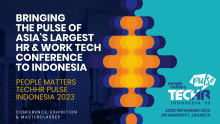HR, the anchor of transformation

The biggest challenge from ancient times for 'HR,' in yesteryears, was called the Personnel Department, which was to retain and engage employees for better productivity. However, the Personnel Department only did compliance checks, managed disciplinary matters to a level where a peon would take away morning time office register from the hands of the employee one minute late.
From that era, the Personnel Department moved to become an HR function focused on employee engagement. The approach was to provide appropriate and enough equipment, material, and a suitable environment to promote it. People aspired to have a stable life with very few changes, whether it is work or personal life sphere.
The working environment, aspirations of people, have changed multifold and at an unbelievable pace. Rightly so in the world where a gramophone ruled its market for more than a century only to be replaced by radio, which replaced Gramophone and captured its market for half a century. After this change, the portable music device industry saw tape recorder, walkman, disc man, and then iPods and many smaller devices. Cost, space, convenience played a pivotal role in the genesis of new era portable music devices. Now all these devices have lost their existence to the web or mobile applications at a much faster pace.
While machines have been changing around the human ecosystem, human beings have also changed. Their career aspirations, engagement needs, comfort definition, passion drivers, learning needs & means of it, and on an overall basis, their lifestyle has changed completely. In this context of more than ever-accelerating pace of change has brought transformation to the HR function. Their approach to training people has got a hit of checking skill relevance in a short span. Employees have also evolved to demand meaning and joy in what they do, and it keeps on changing.
It isn't a problem of a generation, but it is a problem for many generations. People always long to be with whatever they are passionate about and wish to pursue. A few predictive tools claim to have found a way to define personal inclination, preference, or choice basis assessment; there is no way to tell that a particular person is or will be passionate about something specific. The situation at hand is very complicated. We have outgoing people, with risk-taking appetite, ready to experiment with the unknown, learn through new modes like mobile apps, digital platforms than other traditional methods. However, employers have not been able to harness that opportunity to a large extent.
The IT industry changed its approach from skill to re-skill shift. Their customers asked for more controlled development services with better time and cost management. It was too difficult for the industry to cater to waterfall methodologies. Therefore, the agile approach was adopted.
On the one hand, customers have better control; delivery timelines cost limits are better honored., and on the other hand, the development team has to work on the part of project work, simultaneously re-skill oneself on relevant technologies to complete the next part of the project. All top IT companies have preferred reskilling over hiring and skilling. The new-age learning systems have a shortened span of material availability; virtual and digital pieces of training have killed trainer's physical presence dependencies. Machine Learning has made it far more interactive to imbibe new concepts at a faster pace.
The global trends are impacting the need for learning. As per a BCG article, 61% of the population feels that global trends are affecting their job, and it will continue to do so. This sense of need to change or, in a way, finding passion has significantly been there across India.
From employee utilization perspective, it is pertinent to promote reskilling than to put them on the bench and let them wait for a relevant project till it arrives, it is better to provide an environment where people aren't fearful of trying, reskilling, making mistakes or even failing.
HR in India is moving in that direction at a rapid pace, where keeping people in the system with providing a passion match approach is going to be visible very soon.
Their control over correct data sources, its analytics will help them understand the need for their intervention to enable reskilling as a way of living and to thrive as a working community for better business outcomes. In this context, HR needs to rethink new ways of talent acquisition, which are aspiration or passion match based, assessments that bring out agility understanding in a candidate, and reskilling as a way of life. Much work has happened on this front to match the changing organizational needs with ATS, artificial intelligence and machine learning, digital learning, and assessment platforms. However, the struggle is much more complicated















